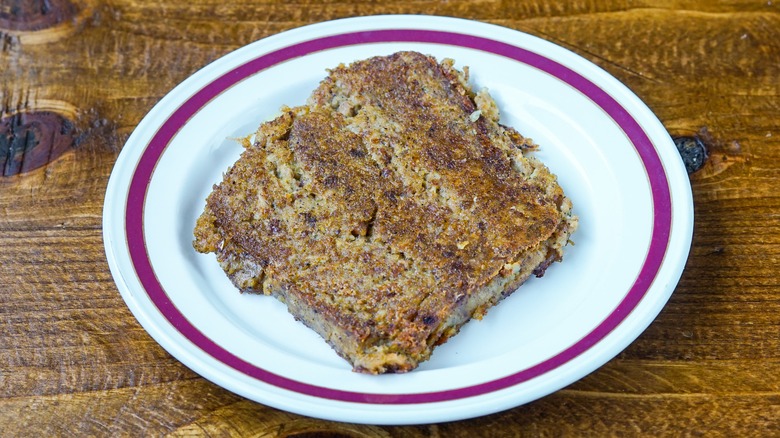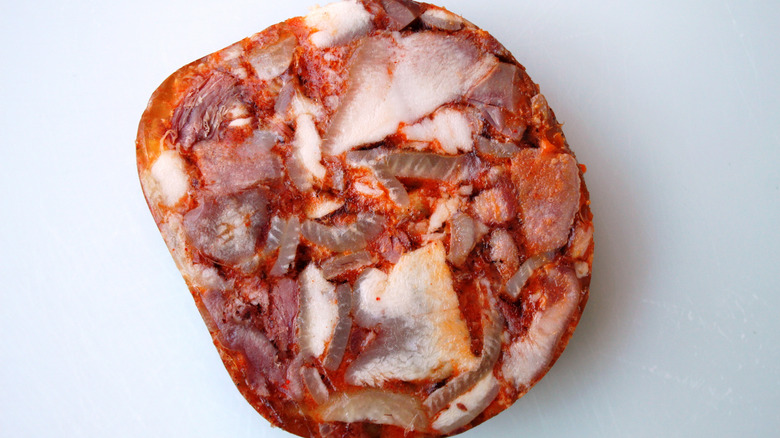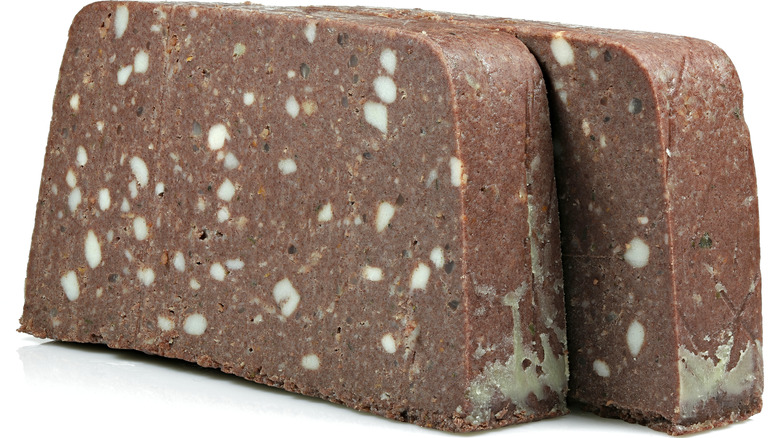The Festival Devoted Almost Exclusively To Scrapple
It's always a delight to look at the letters on your tiles, cross reference them with the words on the board, and see what you can come up with — Oh, wait, that's Scrabble. We're talking about scrapple, the traditional pork snack of the rural Mid-Atlantic (via the Los Angeles Times). Scrapple is pig meat, often including organs like the heart, head, liver, and even boiled, finely minced bones, as well as cornmeal and flour. All of this is combined into a mush, spiced with black pepper, sage, or thyme, then cooked into loaves. Little bits are then sliced off and butter-fried until they're golden brown. The savory, rich result can be eaten in combination with anything from applesauce to eggs, honey to jelly, ketchup, and maple syrup in order to make a variety of breakfast dishes.
At least, that's the classic way to make it. Eater notes that scrapple is actually a broad category including three or more variations. As mentioned, traditional scrapple has pork and cornmeal (or even buckwheat). The goetta version uses oats instead of cornmeal or buckwheat and sometimes incorporates beef, too. It occasionally appears in warm, savory dishes like burgers, hot dogs, and pizzas. Meanwhile, livermush (also known as liver pudding) exclusively uses pork and cornmeal but with the mandatory inclusion of pork liver. That variety is often included in cold sandwiches, setting it somewhat apart from the others.
But where did this distinctive food come from?
Historical background
Scrapple's rural Mid-Atlantic popularity points towards its origins. The Los Angeles Times says the food began as a peasant tradition where folks would make sure that nothing went to waste. Smithsonian Magazine explains that its roots lie in Dutch and German cuisine, such as black blood puddings. Pennsylvania Dutch immigrants brought "pawnhoss," scrapple's ancestor, to the new world, omitted the blood, and introduced American grains like buckwheat and cornmeal, while seasonally using new seasonings (apparently coriander and marjoram are options). Farmers' Almanac states this all occurred around the 1600s and1700s, in areas like Pennsylvania's Chester County and Philadelphia. From there, the tradition spread to Baltimore, Delaware, New Jersey, Maryland, Virginia, and Washington D.C., where it remains popular to this day. Scrapple might even have led to the creation of Labor Day!
Eater gets further into the weeds, explaining that "scrapple" may be derived from a German word for "scraps" — appetizing! While the scrapple variety is Pennsylvanian, livermush emerged from Southern Appalachia after the Great Wagon Road migration brought Pennsylvania Dutch down in that direction, and goetta came from German immigrants who settled in Ohio. Obviously, the scrapple concept is pretty widespread. As a result, it's earned quite a following, to the point there's even an annual festival celebrating it.
The big event goes down in Delaware
Back in the '90s, residents of one town decided to promote their home and its agriculture. That town was Bridgeville, Delaware, and for the past three decades, they've been hosting the annual Apple Scrapple festival almost every October. Specifically, the event celebrates local scrapple, as well as apples, presumably together because they rhyme. Apples are grown aplenty in the area, and apparently, RAPA Scrapple has been processing the porky item there ever since 1926. The fest features an incredible array of entertainment including carnival rides, children's games, a food court, live performances, and various shows, as well as special events like the Little Miss Apple Scrapple Pageant and the Invitational Scrapple Sling. What was once a gathering of a couple thousand has since grown into a convention of tens of thousands, according to USA Today, with folks lining up to try apple dumplings and scrapple sandwiches.
It turns out, the Apple Scrapple festival isn't even the only event dedicated to scrapple. Per Eater, there's also the Mid-Atlantic Wine and Food's annual Scrapplegasm Dinner, North Carolina's spring and fall Livermush festivals, and Newport, Kentucky's Goettafest, among others.


